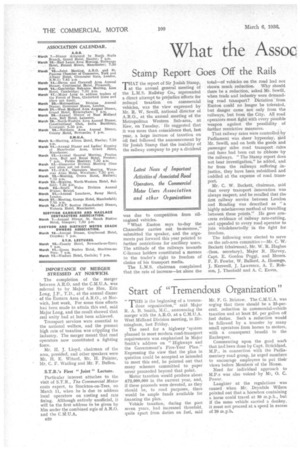Stamp Report Goes Off the Rails
Page 30

If you've noticed an error in this article please click here to report it so we can fix it.
THAT the report of Sir Josiah Stamp, at the annual general meeting of the L.M.S. Railvkay Co., represented a direct attempt to prejudice efforts for reduced taxation on commercial vehicles, was the view expressed by Mr. R. W. Sewill, national director of A.R.O., at the annual meeting of the Metropolitan Western Sub-area, at Kew, on Tuesday. He suggested that it was more than coincidence that, last year, a large increase of taxation on oil fuel followed the announcement by Sir Josiah Stamp that the inability of the railway company to pay a dividend
was due to competition from oil engined vehicles.
"What Euston says to-day the Chancellor carries out to-morrow," submitted the speaker, and the arguments put forward this year pointed to further restrictions for ancillary users. The attitude of the railways towards C-licence holders constituted a menace to the trader's right to freedom of choice of his transport media.
The L.M.S. chairman complained that the rate of increase-let alone the total-of vehicles on the road had not shown much reduction. Why should there be a reduction, asked Mr. Sewall, when trade and industry were demanding road transport? Dictation from Euston could no longer be tolerated, but danger came not only from the railways, but from the City. All road operators must fight with every possible weapon against the possibility of further restrictive measures.
That railway rates were controlled-by Parliament was sheer hypocrisy, Said Mr. Sewill, and on both the goods and passenger sides road transport . rates and fares had been cut to ribbons by the railways. "The Stamp report does not bear investigation," he added, and far from the railways suffering injustice, they have been subsidized and coddled at the expense of road transport.
Mr. C. W. Beckett, chairman, said that every transport innovation was always suspect, and he recalled that the first railway service between London and Reading was described as "a highly mischievous method of travelling between these points." He gave concrete evidence of 'railway rate-cutting, and appealed to every road operator to join wholeheartedly in the fight for freedom.
The following were elected to serve on the sub-area committee :-Mr. C. W. Beckett (chairman), Mr. NV:R. Hughes . (hon. secretary), Major R. Harvey, Capt. E. Gordon Poggi, and Messrs. F. F. Fowler, W. Ballard, A. Housego, J. Kerswell, J. Lawrence, A. T. Robson, J. Theobald and A. C. Eaves..




















































































